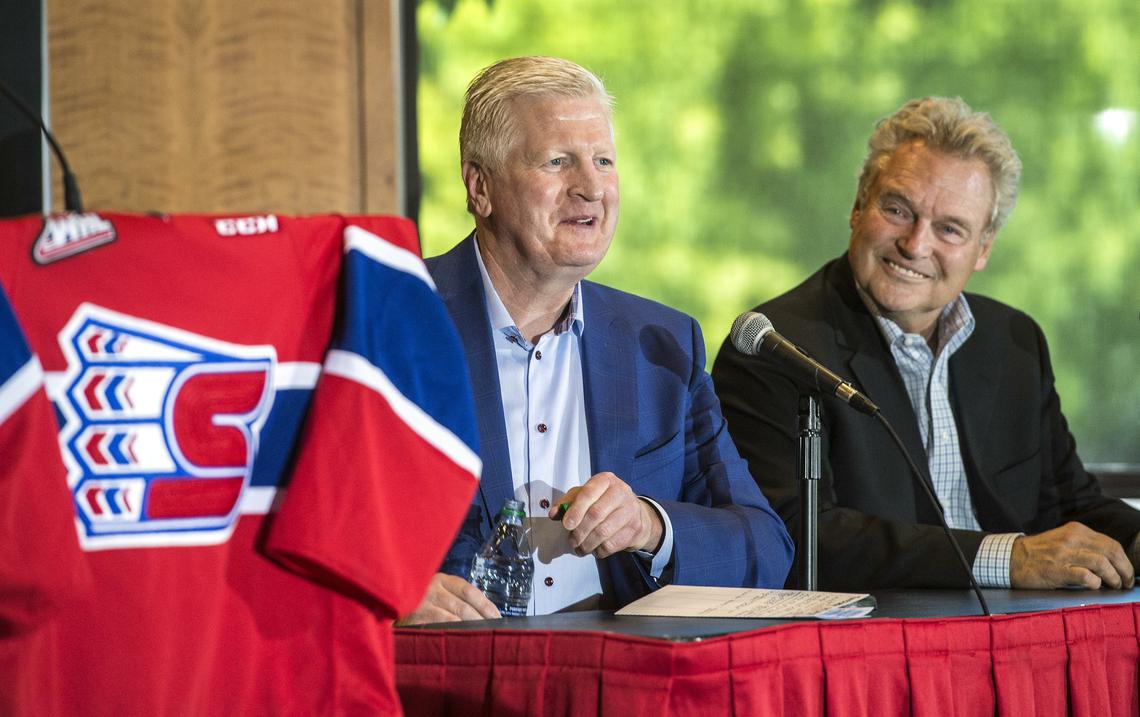The Maple Leafs’ Director of Western Scouting, Tim Speltz, joined ESPN 700 Spokane to discuss leaving the Chiefs for an NHL gig in Toronto.
After nearly three decades, how’s it feel starting a new job?
Tim Speltz: It’s going to be different in a lot of ways. It’s interesting. Lou Lamoriello, when he presented the job opportunity to me, said, “you’re not looking for a change, you don’t think you need a change, but believe me because I’ve been through it – you’ll be better with a change. It will be challenging, and it will be very invigorating and rewarding.” So far it has been exciting. I’m definitely looking forward to it. I can honestly say that I wasn’t thinking a month ago that I was going to be doing anything but [be the Chiefs’ GM]. I was 100% satisfied, but when the opportunity was presented to me, it was exciting. Probably just as exciting was the support and enthusiasm from my family and also the Chiefs organization led by Bobby Brett. That was special, and it made it a lot easier for me to feel that this was the right thing to do.
I know that you’ve had chances and turned them down to do other things. Why this chance? Why now? Why did you say yes this time?
Speltz: Honestly, and I’m not trying to downplay anything, but let’s clarify the other chances. The other chances were to throw your hat in the ring to be a candidate. Rightly or wrongly, I honestly believed that the job I had was a very, very special job. It was a job that I revered very highly and respected very much. I really felt that I didn’t want to look for another job and I wasn’t interested in being another candidate. Maybe that was my insecurity. I didn’t need Bobby Brett thinking I was looking or to let the organization down that way. I just looked at it, I didn’t think anything was right, and I was never looking for a job. Maybe the best opportunity I would’ve had was in 2008 after we won the Memorial Cup. I had a team contact me about an opportunity and I said, “yes, I would be interested in being a candidate, but I want you to know that, if I do get offered the job, I still might not take it. I’m very satisfied with what I’m doing and where I’m at.” I wanted to be honest. NHL teams aren’t interested in you saying no to their jobs. I was no longer a candidate, which I understood totally. It would be no different if I was trying to hire someone here and they said, “yeah, I’d interview, but if I got the job I still might say no.” I probably wouldn’t have any interest. But that’s how much respect and how much regard I had for this opportunity.
This one, they came and offered me the job. It was the Toronto Maple Leafs, it was Mark Hunter, it was Lou Lamoriello, with the support and endorsement from Mike Babcock. I think the interesting thing is Mark came first and then he went to Mike. I got a strong endorsement there. This just seemed different, this just seemed special; once in the lifetime. As Bobby so eloquently put it, “if you don’t take this, you’re an idiot. What job are you waiting for?” That put it into perspective a little bit as well.
When the Stanley Cup comes to town, and you don’t touch it, I’m like, “you’re not going to win a Stanley Cup in Spokane. You’re fine, you can touch the thing.” Has it hit you yet that that is now a possibility? It’s a long shot right now — you guys have go to do some building – but it’s a possibility that you could win that thing now.
Speltz: Exactly. If you’re not involved with the team, you know you don’t have any chance. And now you’ve got a chance. It’s just like the movie. “So you’re saying I’ve got a chance.”
I think, and I always believe so much in the process, that we’re a long way away from thinking Stanley Cup, but you’re right. You’re in the league where that’s the prize; that’s what you play for. So you do have that chance. I think there are a lot of steps in the process before that outcome is possible.
The fact that you can still live in Spokane – how much did that factor into your decision to leave the Chiefs to go to work for the Maple Leafs?
Speltz: It just made everything so much easier. I love Spokane. We’ve lived here for a better part of three decades, or a quarter century. It’s the only home my girls know. It’s very comfortable for my wife. And that’s not easy to transplant from Canada and go somewhere you don’t have any relatives or support other than the people you work with. She did that, and now she’s back teaching and she has her career. It just made it so much simpler. Not that it would be a deal breaker if I couldn’t, but it just made things so much simpler. It also helped me to know that this is home for me and I could be a little closer to my Chiefs. That’s so important for me.
Obviously, one of the reasons they want you for this job is that probably no one knows junior hockey in the Western region better than you. As far as the WHL goes, do you feel like you’re on good terms with everyone, having been a competitor? Any fences you’ve got to mend between now and taking over?
Speltz: Probably, I guess is is the best way to put that. Tri City and Spokane have a great rivalry for a lot of reasons. It’s a rivalry. You sure try to be respectful, and it doesn’t matter who the partner is when you’re at the board tables and different things. It’s a competition when the games are on the ice. At the board table, it’s not necessarily a competition, but you basically have your beliefs and you stick up for what you think is right, whether that’s a vision or an idea or a principle. I think, at the same time, you try to be professional at that. I think, at the end of the day, the WHL is a great league. It is a competitive league. The coaches are competitive, the GMs are competitive on ice, but I think when it’s off ice everyone is interested in the betterment of their players. I sure think that the information that you need and want… you might have to prove yourself a little bit to some people, but at the same time I think that’s something that will happen.
Your good pal Kelly McCrimmon in Brandon is the owner and long-time coach and GM. You guys made your first trade back when you were the GM in Medicine Hat; the Trevor Kidd trade. The fact that he left to the NHL – did that have any impact on you and the decision you just made?
Speltz: I am great friends with Kelly. We’ve been in it for a long time. We both got in at a young age when it wasn’t a young guys’ league, and we had nobody else but each other at that time. It didn’t influence my decision. Indirectly, did it maybe help Toronto, where they thought, “geez, this is what we were thinking, this confirms what we thought with junior operators?” That could’ve been the case. It wasn’t with me. I didn’t think I had to get going because Kelly had his opportunity. I was very excited for him. I did flat out tell him, “hey, don’t screw it up. If you do well, we could get opportunities. It could be good opportunities for junior hockey.” I did tell him that, but at the same time it wasn’t influencing my decision directly. Indirectly, was it with Toronto? I don’t know.
What exactly are you going to be doing for the Maple Leafs? What will your new job entail?
Speltz: I’ll get a better idea of that when we get together at Leaf camp and at rookie camp. The one thing about Lou Lamoriello and Mark Hunter is that they are direct guys. They said, “We want to do a good job finding players.” I think that’s the focus. There are no managerial duties or anything else that I have to do other than find a way to get good coverage, get good viewings on prospects in the Western league, prospects across Canada, including Europe, and at the same time I’ve got to get a handle on the American league and I’ve got to get a handle on the NHL. But I think, when you look at what is the priority, it’s getting a good handle on the amateurs. That’s, for me, the number one way to build an organization at the NHL level.
We talked about you growing up in Canada as a hockey fan. Were you a Leafs fan? We talked about how they’re kind of like the Yankees up there. Was this the team you grew up hoping to be with one day?
Speltz: It was interesting. As a Canadian, there weren’t very many teams. When you grew up in Canada, the only games were Montreal or Toronto. Those were the games you got on Saturday nights. I was bitterly, bitterly opposed to the Montreal Canadiens just because of the success they had had. They were predominantly a championship club and I kind of went for the underdog at that time. Toronto was that. I was more a Toronto Maple Leaf fan than anything else at that time. I think they’ve always been a well revered and regarded franchise to any Canadian. They’re the Maple Leafs and they wear the Maple Leaf. I think that’s been special. I’ve always been a supporter, but at the same time I can honestly say that I sure didn’t think I would be working for the Toronto Maple Leafs.
Are you going to have a say and a hand in who replaces you?
Speltz: I think indirectly. I’ll sure be involved in the search. I’m hoping I can come up with some names and a recommendation. That’s very important to me because of my involvement in the recruiting and the families and the players that are coming, and the players that are here. At the same time, I really believe that the GM coming in is going to have to be a good fit with Bobby Brett and is going to have to be a good fit with our Vice President of Business Operations, Mark Miles. Mark has been here for over 22 years. Mark understands how the franchise operates and how it works. Like Bobby, he’s not going to be involved in making trades for this player or that player, but I think philosophically he knows the ideals and what the organization projects. I think that GM has to be a fit for those two guys. But at the same time, I’ll be surprised if the guy that fits for them isn’t a guy that I sure agree with as well.
You’ll be going from a situation where you’re the boss; under Bobby, you’re basically the guy who calls the shots operationally for the Chiefs. Now you’re going to a place where you’re only going to control your little world. Are you looking forward to different responsibility than what you had with the Chiefs?
Speltz: The one thing with being a General Manager – I say it’s like being a firefighter. You’re going to have to fight a certain amount of fires every day. You don’t quite know that they are yet, and you don’t until you get to work. Sometimes you never do get to your to-do list because of things that come up, but you’re doing everything. I am going to miss the day-to-day involvement with everything from our equipment manager to our financial statement meetings, to our medical and coaching staff, to the business operations, the tickets, the sponsorships. I’m going to miss that. I really am. And yet, there are some things that, after 26 years, riding on the bus – it’s a part of it and you have to do it, but there’s a couple of things I’m not going to miss. That’s going to be one of those. I think, when I look at the other opportunity, it’s more specific. You’re watching and evaluating players. You are trying to figure out your schedule; you’re trying to figure out how to be efficient to get from here to see one player and there to see that player. I’ve got to get viewings, and then you have to have an opinion. Any time you have an opinion you run the risk of being wrong, but you can never be right if you don’t have an opinion. I think a lot of times scouts are guilty of either liking nobody or liking everybody. You have to watch guys enough and you have to project and say, “that’s the guy who I think is the right choice at that pick,” or, “that’s the guy I think we should be trading assets to acquire and get him up where we can get him.” That’s what they’re hoping for and that’s what I have to do a good job at. That’s important, and that’s what the challenge will be for me for sure.
Is it kind of cool that there may be a player in the WHL that you’ve been watching the past year or two going, “man, I wish we had that guy,” and now you can go and get that guy?
Speltz: That is exciting. There are a couple of those that have come to mind already. You look at players and you have to project what they’re going to be. That’s the toughest thing. You’ve also got to get to know the guys. When you knew Tyler Johnson as a person, you knew that he was going to make the most of his opportunity when he got it. I don’t think anybody projected Tyler to be the player that he is as quickly as he is. But he had such a solid foundation. When you are in the inner circle and you knew him, you knew he had that. You try to get to know that knowledge and get to know what type of family a kid comes from and where he’s at. Could you imagine how smart the scout or the organization would’ve been that drafted Tyler Johnson in the fifth, sixth or seventh round? That guy would work forever, doing that. No different than the scout that brought Jared Spurgeon to Traverse City because they were short a defenceman. I said to Brian, “Spurgeon will keep you working for the rest of your life.” Those are the things where, had you done the groundwork, you may have been able to find that guy. You hope you can, and yet if it was easy one of those 30 teams would’ve picked him. It isn’t easy; there’s no question about that.
Transcribed by Alec Brownscombe


































